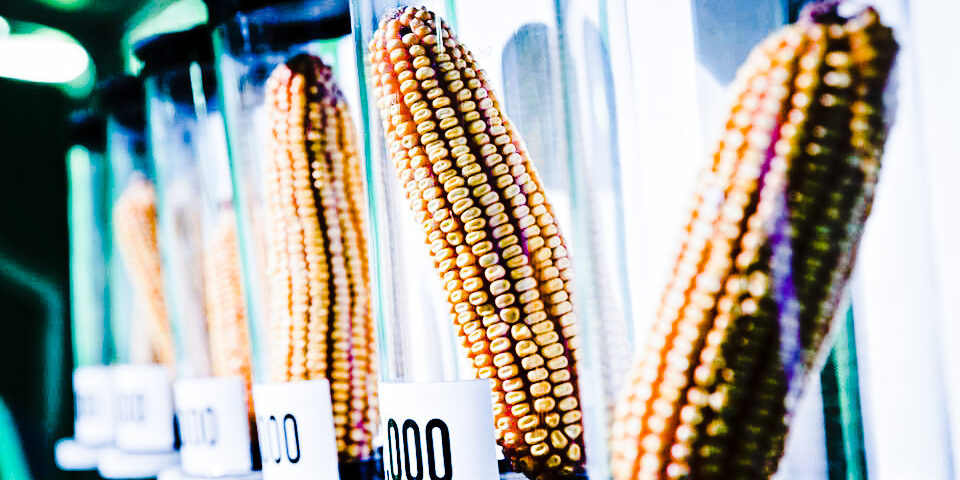Good or Bad?: How people feel about eating edited food
Sub-Saharan African countries particularly face raging drought-like scenarios. This is no different in Nigeria where insect pests attacks also negatively deter enough food supply to meet the needs of over 200 million people.

Even though they find themselves struggling to have enough to eat, still, some Nigerians do not want to jeopardise normalcy when it comes to how their foods are grown. This is why there has been individual resistance springing up in the country to reject a genetically modified maize seedling that federal officials have just introduced to farmers.
Given our national deficiency in maize production estimated at 6 million metric tons per annual, says the Minister of State for Agriculture and Food Security Senator Aliyu Sabi Abdullahi at a 12 June unveiling in Abuja, this variety will gradually close up that deficit in the next three years if 1.5 million hectares of our six million hectares [are] planted to TELA maize.
The problem of climate change has worsened food shortages and grains have been significantly impacted, hence the need to ensure the rapidity of access to the crop.
A primary motivation driving scientists to apply their minds to the invention of genetically modified organisms (GMOs) like maize is to boost their resilience against natural detractors.
ALSO READ: Wondering what Tomato Ebola is and why it is bringing in scarcity?
Sub-Saharan African countries particularly face raging drought-like scenarios. This is no different in Nigeria where insect pests attacks also negatively deter enough food supply to meet the needs of over 200 million people, yet a section of this population isn’t backing down on their opposition to the TELA Maize seedling since they are thinking it could bring harm to them and their growth.

What hasn’t helped this discussion is the association that the African Agricultural Technology Foundation (AATF), the coordinator of the TELA Project, has with Microsoft founder Bill Gates, who has been linked with several conspiracy theories.
On X, a tweet by Ụkaegbu Mmesọma reeked of scepticism when the user wrote: Here it is, people! This is the bag that every human being in Nigeria must kick out of their lives and environments with holy anger. This is the so-called TELA maize bag. Show it to our farmers in the village and to your relatives.
The obvious preference of this user Mmesọma is organic crops with no connection with the Bill & Melinda Gates Foundation, whose support through a public-private partnership with other institutional collaborators, made TELA Maize possible.
Here it is, people! This is the bag that every human being in Nigeria must kick out of their lives and environments with holy anger. This is the so called TELA maize bag. Show it to our farmers in the village and to your relatives… pic.twitter.com/Z78alJIaqI
— Ụkaegbu Mmesọma (@DaVinci01709908) June 25, 2024
While the sceptics keep growing, there have been efforts by the National Biosafety Management Agency (NBMA) to keep the narratives in check.
Advocacy by this federal government organisation will no doubt go on for a while, but on Monday 24 June, it released a statement confirming that due diligence had been done and that no Nigerian is at risk of consuming the yields that would follow planting.
The application for TELA Maize was thoroughly examined by two committees comprising of experts and scientists composed of experts from the various relevant Agencies [and Academia], namely NAFDAC, SON, NAQS, FCCPC, NASC, universities, research institutions among others who are professionals in the field and our internal review process confirmed that TELA Maize meets safety standards, an NBMA tweet had read.
Doubters remain and perhaps will continue with their opposition for the foreseeable future. Yet, those curious Nigerians are asking where they can get the genetically modified maize seedling because of its high yields, unlike the organic variant that remains susceptible to droughts and insects like the stem borer that distort the anatomy of the grain crops.
TELA MAIZE IS SAFE AND IS NOT LACED WITH CHEMICALS pic.twitter.com/mW6u92hQQB
— NBMA, Nigeria (@BiosafetyNig) June 24, 2024
The Latin name TELA itself is a literal representation of what the GMO is expected to do. Translated, it means protection, obviously against limited water situations and repelling pests where pesticides would have been used.
ALSO READ: From inmates to farmers: Picturing how prisons might soon start growing food
A soil bacterium Bacillus thuringiensis makes this possible. It produces what is known as Bt protein, which deters invasive insects from burrowing through the maize crop. Therefore, the solution to the food insecurity that Nigeria grapples with may have arrived.

Ayodelé is a Lagos-based journalist and the Content and Editorial Coordinator at Meiza. All around the megacity, I am steering diverse lifestyle magazine audiences with ingenious hacks and insights that spur fast, informed decisions in their busy lives.




![Longer life expectancy will benefit older adults by providing additional years to enjoy their pension perks, socialise with family and friends, as well as pursue personal interests. [Borgen Project]](http://meiza.ng/wp-content/uploads/2024/05/Longer-life-expectancy-will-benefit-older-adults-by-providing-additional-years-to-enjoy-their-pension-perks-socialise-with-family-and-friends-as-well-as-pursue-personal-interests-e1716570118680-390x220.jpg)
![Most certainly, men who already stumbled upon the proposed hack to enhance their prostate health through frequent sex may feel ruined if they do not have partners or wives who share their enthusiasm for bedroom action. [Freepik]](http://meiza.ng/wp-content/uploads/2024/05/african-american-artist-looking-vase-design-inspiration-draw-canvas-creativity-studio-room-home-black-adult-man-using-pencil-masterpiece-drawing-creating-fine-art_edited-scaled-e1716381738992-390x220.jpg)
